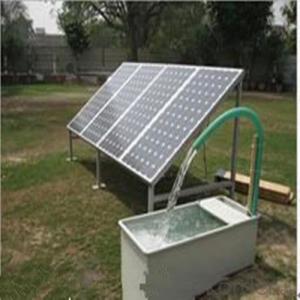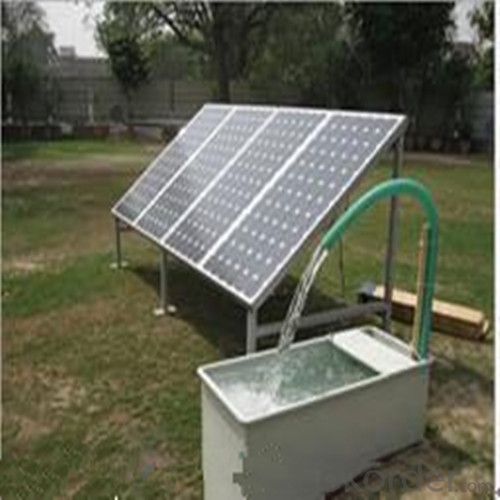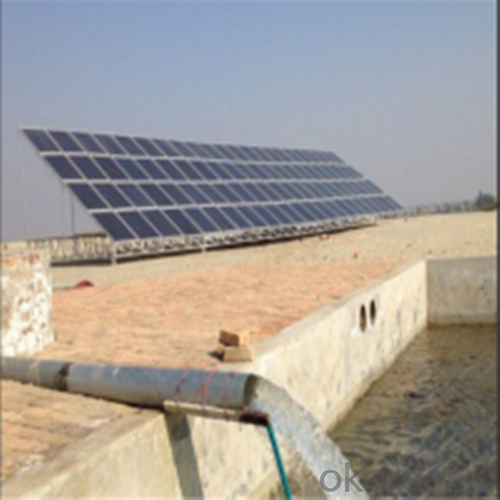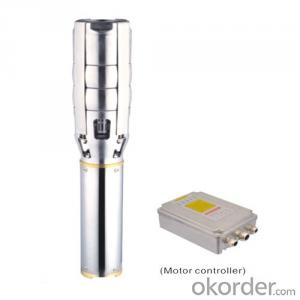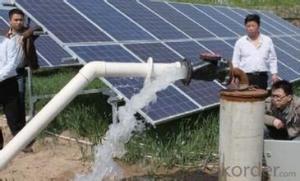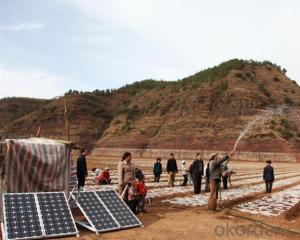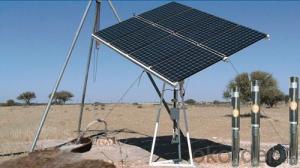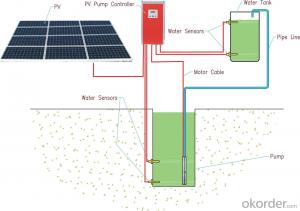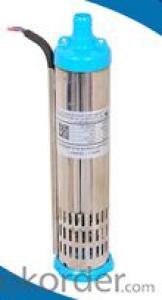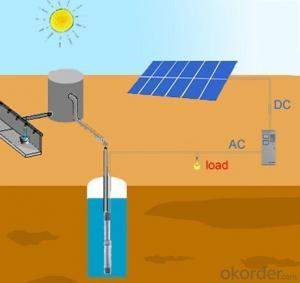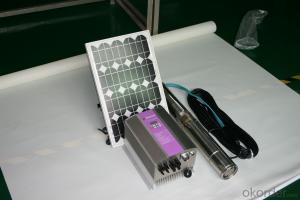Nemo Solar Pump - Solar Water Pumping Systems Solar Energy Water Pump
- Loading Port:
- Shanghai
- Payment Terms:
- TT OR LC
- Min Order Qty:
- 1 set
- Supply Capability:
- 1000 set/month
OKorder Service Pledge
OKorder Financial Service
You Might Also Like
Solar Water Pumping Systems Solar Energy Water Pump
DC solar water pumping system consists of the motor, pump, controller, solar array and some other accessories, such as water level sensor, float switch, etc. Considered that storing water is more efficient than storing electricity, the system is designed to directly drive the pump without battery which can reduce the construction and operating cost and routine maintenance effectively.The PV array consists of multiple solar panels connected in series/parallel, which can supply the whole system as power source by converting the absorbed solar radiation energy to the electrical energy. The pump driven by a brushless DC permanent magnet motor draws water from deep-well or river. The pumped water is then fed into reservoir or water tank, or connected to the irrigation system or fountain system directly.
Advanced Technology
Applications Innovation
The efficiency of DC brushless permanent magnet motor has been increased up to 25% in comparison with traditional asynchronous motor.
Technology Innovation
Stator and rotor are sealed by environment friendly casting resin.Motor insulation resistance can be hold higher than 300MΩfor more than 10 years, which consumedly increased the security and reliability of the submersible motor.
Structure Innovation
Casting resign technology processed stator and rotor as well as the water lubricated bearing make the submersible pump environment friendly.
Feature
High Efficiency & High Reliability
DC Brushless Permanent Magnet Motor
Minimum Maintenance, long Service Life
Environment Friendly Materials, Lubricated Without Oil
Application
Village or Family Water Supply
Animal Drinking Water & Livestock Watering
Garden/Courtyard Irrigation
Swimming Pool
Water Supply for Bivouac or Camping Car
Water Supply for Remote Area
Automatic Control
Operate Automatically, No Need Watching
Maximum Power Point Tracking (MPPT)
Dry-run Protection
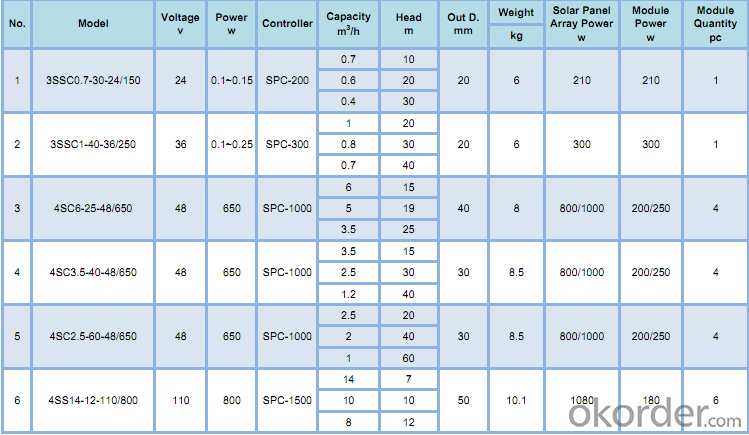
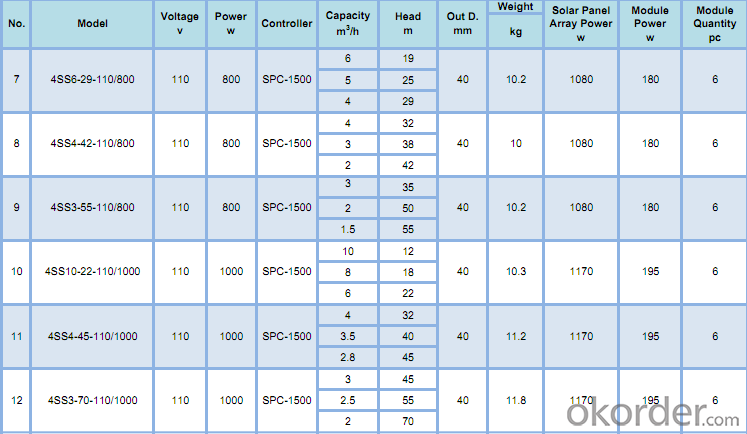
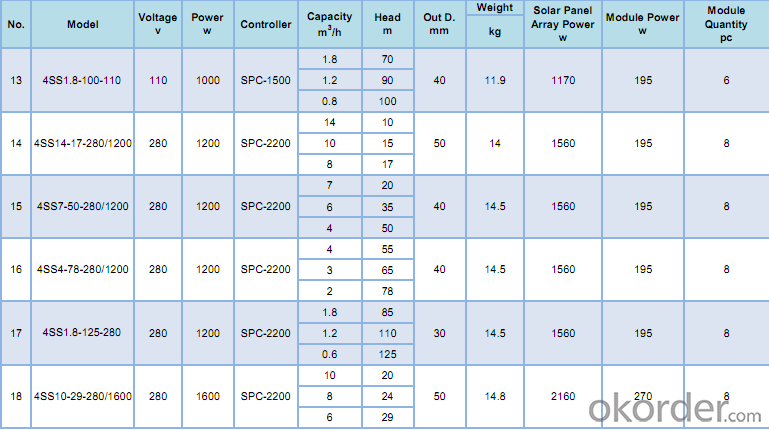
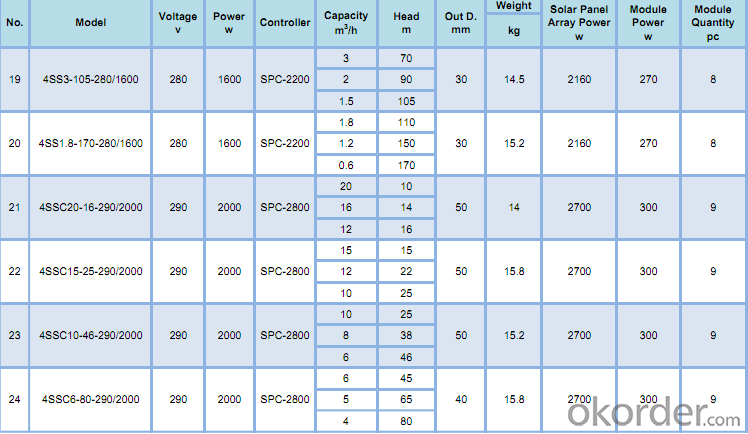
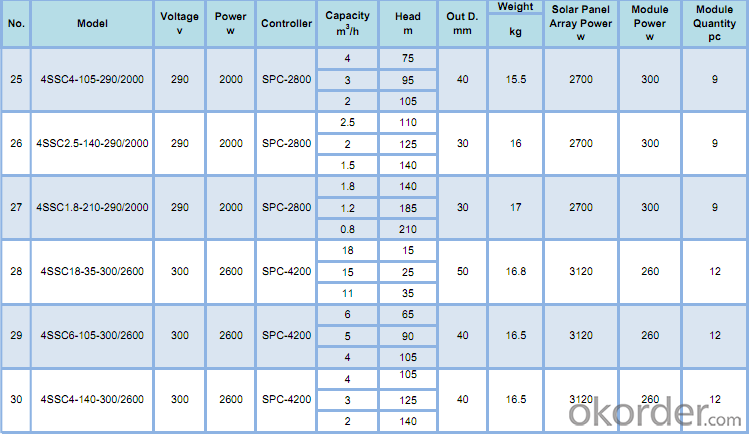
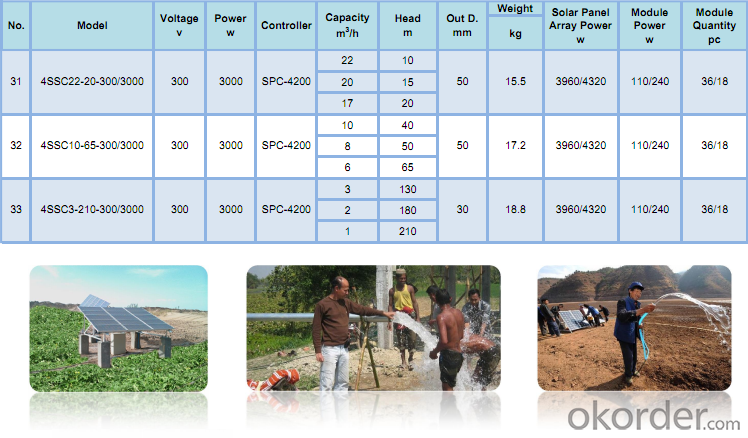
- Q: Can a solar pump be used for water supply in tea estates?
- Yes, a solar pump can be used for water supply in tea estates. Solar pumps are an efficient and sustainable option to extract water from wells, boreholes, or other water sources and can provide a reliable water supply for irrigation in tea estates. They are cost-effective, eco-friendly, and can operate even in remote locations with limited access to electricity.
- Q: How does the exposure to shade or obstructions affect the performance of a solar pump?
- The exposure to shade or obstructions can significantly affect the performance of a solar pump. Solar pumps operate by converting sunlight into electricity, which is then used to power the pump. Therefore, any reduction in sunlight due to shade or obstructions can directly impact the efficiency and output of the solar pump. When a solar pump is exposed to shade, such as from trees, buildings, or other structures, the amount of sunlight reaching the solar panels is reduced. This reduction in sunlight leads to a decrease in the amount of electricity generated by the solar panels. As a result, the pump's performance may be compromised, and it may not be able to operate at its full capacity or even fail to function altogether. Similarly, obstructions like dust, dirt, or debris on the surface of the solar panels can also hinder the absorption of sunlight. These obstructions create a barrier between the sunlight and the solar panels, reducing the efficiency of solar energy conversion. As a consequence, the solar pump may experience a decrease in performance and may require more time to achieve the desired pumping capacity. In addition, it is worth mentioning that the location and orientation of the solar panels also play a crucial role in the exposure to shade or obstructions. Panels that are not properly positioned or installed in areas with limited sunlight exposure will have a direct impact on the performance of the solar pump. To ensure optimal performance, it is important to install solar pumps in areas with maximum sunlight exposure, free from any potential shade or obstructions. Regular maintenance and cleaning of the solar panels can also help prevent the accumulation of dirt or debris that could hinder their efficiency. By taking these precautions, the solar pump can operate efficiently and effectively, providing a reliable and sustainable source of water pumping.
- Q: Can a solar pump be used in areas with limited access to water disinfection systems?
- Yes, a solar pump can be used in areas with limited access to water disinfection systems. Solar pumps are a sustainable and efficient solution for accessing water from sources such as wells, rivers, or lakes. While they primarily serve to extract water, they can be combined with appropriate water treatment technologies, such as filters or disinfection systems, to ensure the water is safe for consumption. By utilizing renewable energy from the sun, solar pumps provide a reliable and cost-effective option for accessing and treating water in areas with limited access to traditional water disinfection systems.
- Q: Are solar pumps suitable for use in orchards?
- Yes, solar pumps are suitable for use in orchards. Solar-powered pumps provide a sustainable and cost-effective solution for irrigation needs in orchards, as they utilize clean and renewable energy from the sun. They can effectively supply water to fruit trees, ensuring proper hydration and maximizing crop yield while reducing operating costs and environmental impact.
- Q: Can a solar pump be used for water supply in remote research stations?
- Yes, a solar pump can be used for water supply in remote research stations. Solar pumps are an efficient and reliable solution for remote locations as they use solar energy to power the pump and do not require grid electricity. They can provide a sustainable and cost-effective option for accessing water in areas where traditional power sources are limited or unavailable.
- Q: Can a solar pump be used in areas with limited access to water systems?
- Yes, a solar pump can be used in areas with limited access to water systems. Solar pumps are designed to operate using energy from the sun, making them ideal for remote or off-grid locations. They can be used to extract water from wells, rivers, or other natural water sources, providing a reliable and sustainable water supply in areas where traditional water systems are not available.
- Q: Can a solar pump be used in areas with high levels of sediment in the water?
- Yes, a solar pump can be used in areas with high levels of sediment in the water. However, it is important to note that frequent maintenance and cleaning may be required to prevent clogging or damage to the pump. Additionally, using a filtration system or pre-screening the water before it enters the pump can help reduce sediment build-up and ensure the efficient operation of the solar pump.
- Q: How does a solar pump handle water with high levels of salinity?
- A solar pump can handle water with high levels of salinity by using a reverse osmosis system. This system uses a semi-permeable membrane to remove salt and other impurities from the water, allowing it to be used for various purposes such as irrigation or drinking. The solar pump powers the reverse osmosis system, providing an energy-efficient and sustainable solution for pumping and treating saline water.
- Q: Can solar pumps be used to pump water from wells?
- Yes, solar pumps can be used to pump water from wells. Solar-powered pumps utilize photovoltaic panels to convert sunlight into electricity, which powers the pump to draw water from the well. This renewable energy solution is particularly beneficial in remote and off-grid areas where access to electricity may be limited or costly. Solar pumps offer a cost-effective and sustainable alternative to traditional diesel or electric pumps for well water extraction.
- Q: Can a solar pump be used in areas with limited access to water infrastructure?
- Yes, a solar pump can be used in areas with limited access to water infrastructure. Solar pumps are a sustainable and cost-effective solution that can draw water from wells, boreholes, rivers, or other water sources without the need for grid electricity. They can operate independently of the traditional water infrastructure, making them suitable for remote or underserved areas where access to water may be limited.
Send your message to us
Nemo Solar Pump - Solar Water Pumping Systems Solar Energy Water Pump
- Loading Port:
- Shanghai
- Payment Terms:
- TT OR LC
- Min Order Qty:
- 1 set
- Supply Capability:
- 1000 set/month
OKorder Service Pledge
OKorder Financial Service
Similar products
Hot products
Hot Searches
Related keywords
